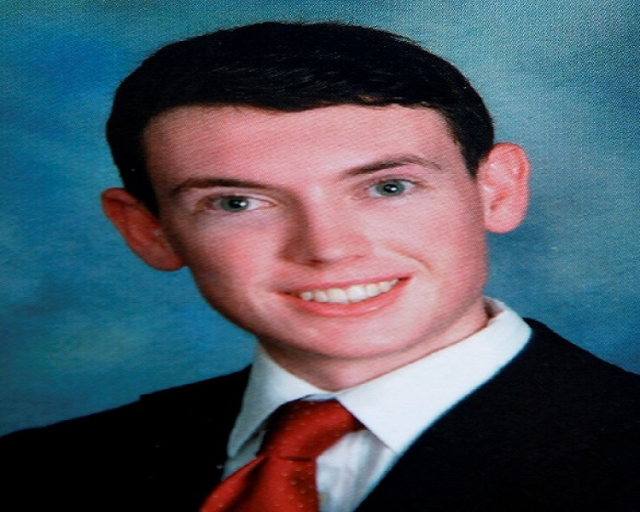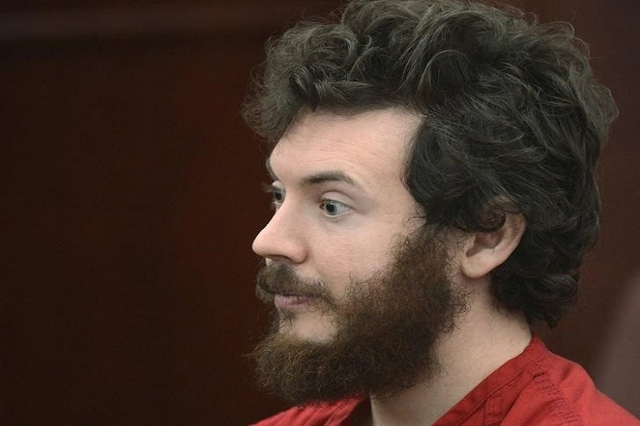Childhood friends, former teachers testify in Colo. theater shooting trial
DENVER — One described him as a quiet, kind boy who doted on his little sister. Another recalled his team spirit on the soccer pitch.
And many remembered the shooter as a smart, shy kid who studied music, was never in trouble, and who no one dreamed would grow up to massacre a dozen people.
Defense lawyers trying to save the life of Colorado movie rampage gunman James Holmes have called witness after witness to take the stand just feet from where he sits, tethered to the floor, expressionless.
All of them, from his former piano teacher to friends of his parents, referred to him as "Jimmy," the child they once knew.
Attorneys for the now 27-year-old convicted killer have presented mitigation evidence which they hope will persuade the jury of nine women and three men to spare him from execution and send him to serve life in prison instead.
At the beginning of his trial in late April, defense lawyers said they would show how Holmes was a normal, happy, social child who could have belonged to any of the jurors, before he was struck by severe mental illness.
But it was only after he was found guilty of all 165 counts related to his July 2012 attack on a crowded midnight screening of a Batman film that the court heard for the first time details of his comfortable early years in central California.
Several former neighbors from Oak Hills, a small enclave of homes set amid farming fields in the Salinas Valley where Holmes spent his grade school years, described a close-knit community where residents celebrated holidays together.
He was one of 14 or 15 boys, all about the same age, who had the run of the neighborhood and often played football, baseball and street hockey together. He was quiet, but active.
"He was a very nice kid; very fun to be around. A good friend," one of the group, Joseph Barrett, now an attorney in Nevada, told the jury.
Barrett's mother Katherine recalled a time when the local kids went to a water park.
Holmes' sister Chris, five years his junior, cried because she could not join the others on the bigger slides. Holmes told her it was alright, and that he would remain and play with her in the small kids' splash park.
"I just remember that was really sweet, when he stayed back with her while the other boys went," Katherine Barrett said.
SISTER SOBS ON STAND
Chris Holmes sobbed on the stand earlier this week as she said she still loved her brother.
She said they were both very lucky their parents had been so supportive in all aspects of their lives, and she said she appreciated how her sibling included her in his activities, even when she tagged along uninvited. They built forts together in the family's back yard, she said, and one time he even showed her a secret treehouse he set up with his friends.
"Sometimes I could be pretty annoying," Chris Holmes said. "It was nice to know that I had someone who was always there."
When the family later relocated about 400 miles south to the San Diego area, her brother, then 12, was so upset he tried to cut his wrist with cardboard while riding in the car.
Questioned by a court-appointed psychiatrist after the massacre, Holmes said he had "felt ignored" by his parents' decision to uproot them all.
In his middle and high school years, he appeared to be more withdrawn, the jury heard, but was still an exceptional student and involved in extracurricular activities. He played trumpet in the middle school band, ran cross-country, and played soccer in high school.
Lori Godwin, a special education teacher and coach of the Westview High School cross country team, said Holmes was not a particularly good runner, and that he lacked proper form and stamina. But he always showed up to practice.
He rarely spoke, however, and she said he declined to take part in team-building activities. "He was part of us, but not part of us ... he was kind of a shadow figure," Godwin said.
Because Holmes was so reserved, she said she thought he might have been suffering from a learning disability. But she said other students told her that he was "crazy smart."
Patrick Silva, a chiropractic student who now lives in California's Bay Area, testified that they played side-by-side on defense for the high school junior varsity soccer team.
They did not run in the same social circles, he said, but he remembered Holmes as a "very funny, very sweet, quiet kid," and respected him as a "great team player" who was never aggressive nor bore grudges on the pitch.
"We all had each others' backs. We didn't start any fights," Silva said of their games together. "I remember Jimmy being very quick, and not afraid. ... He wasn't reactive, he was proactive."


















